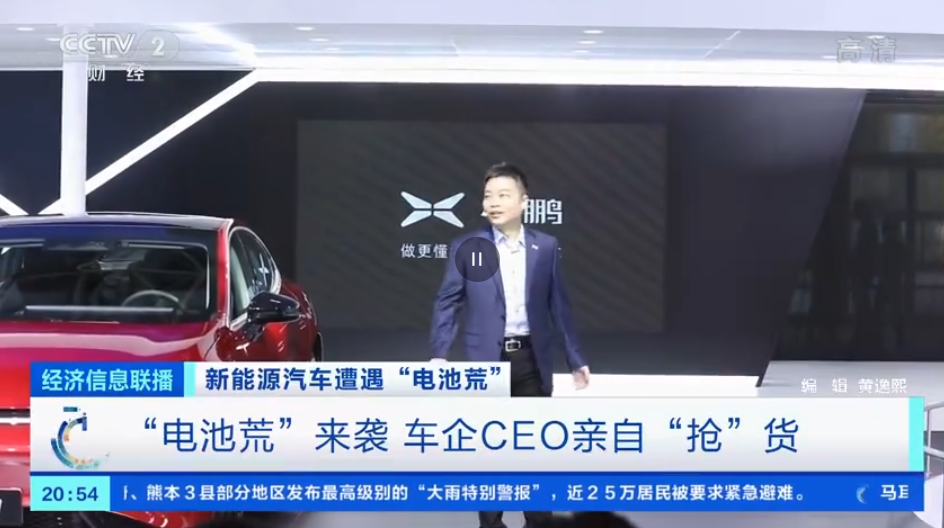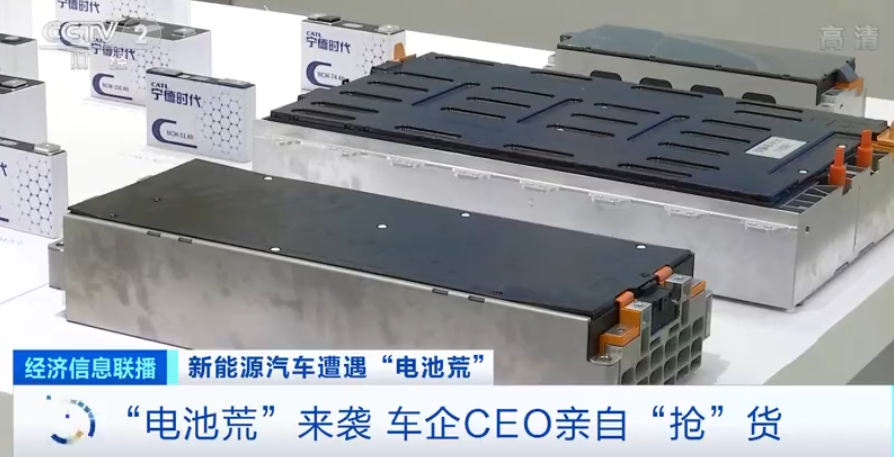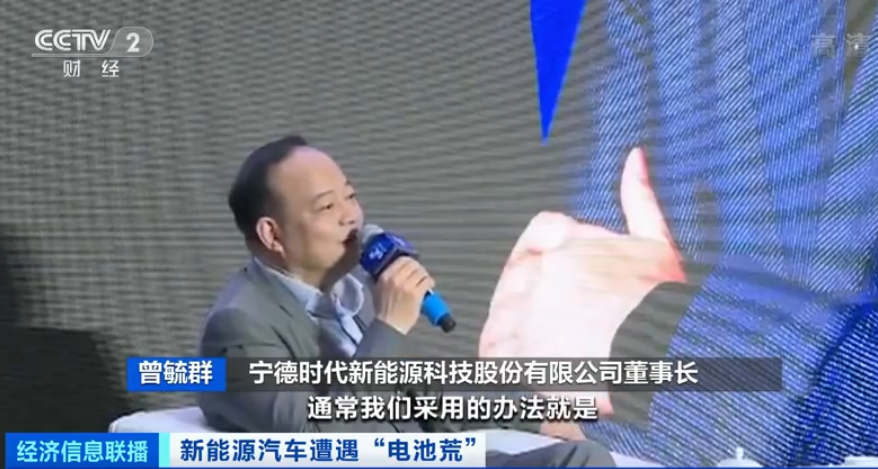In addition to Weibo, there is also WeChat
Please pay attention

WeChat public account
AutoBeta


2024-11-21 Update From: AutoBeta autobeta NAV: AutoBeta > News >
Share
AutoBeta(AutoBeta.net)07/11 Report--
In recent years, with the rapid development of new energy vehicles, the competition of new automobile-related industries is also intensifying. As the heart of new energy vehicles, the importance of power battery is self-evident. Recently, the stock price of power battery Ningde era shows a rising trend, with a total market capitalization of more than 130 million yuan. Behind its capital market performance, it highlights the problem of battery shortage in the new energy vehicle industry. According to earlier media reports, he Xiaopeng, the CEO of Xiaopeng car, crouched in Ningde era for a week in order to get the battery smoothly from Ningde era. And Zeng Yuqun, chairman of Ningde Times, also said at the recent shareholders' meeting that he could not stand the customer's recent demand for goods.

According to the latest data from the China Automobile Association, the production and sales of new energy vehicles reached 248000 and 256000 respectively in June, up 14.3% and 17.7% from the previous month, and 1.3 times and 1.4 times higher than the same period last year. From January to June, China's production and sales of new energy vehicles both exceeded 1.2 million, reaching 1.215 million and 1.206 million respectively, a year-on-year increase of two times, and an increase of 94.4% and 92.3% respectively compared with the same period in 2019. China's power battery production in June totaled 15.2GWh, up 184.3 per cent year-on-year and 10.2 per cent month-on-month. Among them, ternary battery output 7.4GWh, accounting for 48.4% of the total output, up 133.6% from the same period last year, up 47.1% from the previous year; lithium iron phosphate battery output 7.8GWh, accounting for 51.2% of the total output, up 256.4% from the same period last year, down 11.3% from the previous year. From January to June, China's power battery production totaled 74.7GWh, an increase of 217.5% over the same period last year.
In fact, as early as 2015, the shortage of power batteries already exists, which also affects China's new energy vehicle industry. Thus it can be seen that the problem of battery shortage in the new energy automobile industry is not sudden. Car companies and the relevant practitioners of the downstream industry chain have also said that the production of electric vehicles is also restricted because of the insufficient supply of power batteries. It is understood that Ganfeng Lithium Industry is a lithium battery manufacturer in Xinyu City, Jiangxi Province, specializing in supplying Tesla Model 3, BYD Han and other new energy vehicles. The relevant person in charge said that basically 28 days a month for full production. Recently, Yiwei LiNeng also revealed in the announcement that the company's existing venues and production lines have been operating at full capacity and will still be in short supply for nearly a year. According to the relevant data, there are nearly 300 solid-state battery-related enterprises in China. 48% of the relevant enterprises have been established within 5 years, and 20% of the relevant enterprises have been established for more than 15 years.

Industry insiders said that an important reason for the "battery shortage" is the rapid expansion of demand for new energy vehicles, and major car brands have launched electric vehicles one after another, resulting in high-quality capacity of the power battery industry lagging behind and low-end overcapacity. In addition, in addition to the large-scale release of new energy vehicles by traditional car companies, there are new entrants such as Evergrande and Xiaomi to stir up the market. In addition, the prediction of battery demand in the automobile industry is far from the actual demand, which also aggravates the impact of the "battery shortage".
Zhang Xiang, a researcher at the Automotive Industry Innovation Research Center of the Northern University of Technology, said: the phenomenon of battery shortage has always existed in the new energy automobile industry. For example, Volkswagen and Audi have been forced to stop the production of some models because of lack of batteries. For the global new energy automobile industry, the problem of battery supply is like a "sword of Damocles" hanging over its head. In the face of battery shortage, car companies are also holding on to the "thighs" of power battery manufacturers in advance. According to related reports, Great Wall signed a decade-long strategic cooperation framework agreement with Ningde era in early June this year. Tesla CEO Musk has also said many times that Tesla will buy as much as the battery supplier gives. On the evening of June 28, Ningde Times announced that the company had signed an agreement with Tesla to supply Tesla with lithium-ion power battery products for the next four years.

In order to alleviate the "battery shortage", power battery companies have also opened the mode of production expansion. Lithium products are one of the important raw materials for power batteries. In order to meet the market demand, lithium mining enterprises are increasing their production capacity. In addition to upstream enterprises, power battery companies themselves also actively invest in building factories and try to extend upstream. Recently, Zeng Yuqun, founder of Ningde Times, revealed at the shareholders' meeting that a solid-state battery named "sodium ion" will be released in July this year. Xilai first released its self-developed solid-state battery pack in June and is expected to be commercialized in the fourth quarter of 2022. LG Chemical also says it will commercialize all-solid-state batteries between 2025 and 2027; Panasonic plans to launch an electric car with solid-state batteries in 2025. Volkswagen Group announced the launch of solid-state batteries in 2025. Not to be left behind, BMW also announced plans to launch a prototype car with solid-state batteries by 2025.
SNE Research, a global emerging energy market research firm, has also predicted that by 2023, the global demand for power batteries for electric vehicles will reach 406 gigawatt hours (GWH), while the supply of power batteries is expected to be 335 gigawatt hours (GWH), with a shortfall of about 18%. By 2025, the gap will widen to about 40 per cent.

For new energy vehicles, batteries are an indispensable part. Without the battery, everything would be in vain. From the standpoint of consumers, the most direct impact of the "battery shortage" may be the failure to mention new cars as scheduled, or the rising cost of building cars due to tight battery supply, resulting in higher prices for some new cars than ever before. For car companies, the impact of the "battery shortage" not only hinders the pace of releasing new cars, but also affects their plans to deliver new cars.
Welcome to subscribe to the WeChat public account "Automotive Industry Focus" to get the first-hand insider information on the automotive industry and talk about things in the automotive circle. Welcome to break the news! WeChat ID autoWechat
Views: 0
*The comments in the above article only represent the author's personal views and do not represent the views and positions of this website. If you have more insights, please feel free to contribute and share.











© 2024 AutoBeta.Net Tiger Media Company. All rights reserved.